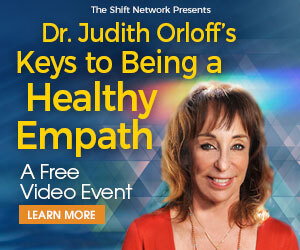
One of the biggest blocks to empathy is a fear of being vulnerable and then overwhelmed. It either seems too painful or unsafe to lovingly explore your own emotions or that you risk getting burned out by other people’s problems, dramas, and needs. Intimates or coworkers may ask more from you than you are prepared to give, but you don’t want to disappoint them. If you set healthy boundaries such as saying no or specifying “I am just able to give you this,” you may feel guilty or that you’re a bad person or fear being rejected.
As an empath, I know how uncomfortable it feels to be deluged by emotions, especially from loved ones. You empathize with them. You care and want to help them or even solve their problems, but it isn’t possible. For instance, when one patient watched his mother experience depression, he began feel depressed, too, until his mother reached out to a therapist and started feeling better. Another patient’s husband had such intense back pain that my patient began experiencing it in her body too. When developing empathy, this is a predictable challenge that can teach you the importance of setting healthy boundaries and self-care.
In addition, you may feel overwhelmed by friends or coworkers who share too much information about their health, romances, or family conflicts. Someone might ambush you with accounts of stress they’ve experienced at work or details of a harrowing illness. Your heart goes out to them but listening can be exhausting.
Like me, many sensitive people are prone to absorbing others’ emotions or physical symptoms. Too much coming at you too fast leads to the misery of sensory overload. In that state, one exasperated patient said, “How am I supposed to explain to people that I can’t be around them because I hear the dryer beeping and the car alarm going off or that everyone is too noisy, and I can feel my toes too much!” They were not exaggerating. To stay centered and prevent sensory overload, I’ve learned the importance of protecting myself so I don’t take on the distress of my patients or anyone else. Also, I try to bow out of a situation and decompress when external stimulation feels too intense.
To start taking a more proactive role in how much empathy you give, I suggest that you keep in mind the following “rights” to help you maintain a healthy mindset and prevent or lessen overwhelm before it gathers momentum.
Set Boundaries to Prevent Overwhelm
- I have the right to say a loving, positive no or no thank-you.
- I have the right to set limits with how long I listen to people’s problems.
- I have the right to rest and not be always available to everyone.
- I have the right to quiet peacefulness in my home and in my heart.
Observe, Don’t Absorb
A principle of self-empathy is to observe a loved one’s emotions but not absorb them. Stay in your own emotional lane and don’t jump into theirs.
Your loved one’s experience is exactly that: their experience. It is not yours! This may be hard to grasp initially. However, if you truly want to help, you must see the person you cherish as separate from you. This protects you from compassion burnout. Allow them to find their own healing path with the support of a therapist, a coach, or other health-care practitioners. If their situation isn’t severe or life-threatening, give them time and space to work through the issue on their own, if that’s their choice. You are not their therapist, nor is it healthy to try to be.
Emotional and physical healing typically involve some suffering. Tolerating a loved one’s discomfort can stretch our hearts, but we must learn to be patient with their aches, pains, and struggles without taking them on. Even so, to be clear: you are not just sitting there doing nothing. Offering your loving presence is a supremely compassionate, healing act from which the other person will benefit.
Finding empathy for yourself and others is a slow but sure change. As a psychiatrist, I’m aware of how hard all of us can be on ourselves. When things go wrong, you blame yourself. Or maybe you’ve taken on your parents’ judgmental voices or painful emotions, though you swore you’d never be like them. It’s all okay. Despite the traumas, neglect, or pain you might have endured, little by little, you can begin to empathize with your own human plight—and your emergence. The most unfamiliar part may be beginning with yourself. Nevertheless, this is the sacred starting place, the break of day.
Reprinted with permission. Excerpt from The Genius of Empathy (Sounds True ©2024) Judith Orloff, MD.




